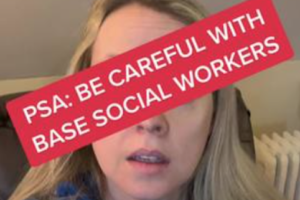
What happens at a board of inquiry?
A board of inquiry is an administrative hearing where the military is attempting to eliminate from the service one of its officers. The board of inquiry is presided over by the president of the board, who is the senior member of the board who can vote on whether or not misconduct happened, and then also vote on whether or not separation is appropriate and if so, at what characterization.
In addition to that presiding member, there’s also two additional board members who are voting members who all three have to be senior to the person who is being eliminated. So largely if you see an O-5 being eliminated, you’ll see either a more senior O-5 or a couple of at least O-6s who are presiding at that board of inquiry. It is guided by a script that is pretty uniform across the board as far as notifying the person being eliminated the bases for which they’re being looked at.
What are their general rights to be there, to have counsel represent them, to examine any witnesses that the board brings. The board of inquiry is notable because it’s administrative. You don’t always get to confront the people who have accused you. A board of inquiry can proceed just based off of the paper alone. So if there’s a police report or a prior sworn statement or a command investigation with supporting evidence, all that, the board’s prosecutor, who is called the recorder needs to do is to just enter that packet into evidence.
But at the board of inquiry, the respondent who is the person being looked at for elimination, can also request that witnesses come. Some will be made available, some may not be. There’s also relaxed rules about witnesses testifying over the phone and via VTC, and those rules are different from a court martial. Boards of inquiry are governed by administrative regulations, and there are fewer forms of objection than you can do at a court martial because there are much fewer rules of evidence. Most of the boards of inquiry still include a rule of evidence that bears upon relevance, but relevance is a pretty low threshold. We’ve been seeing more and more success at keeping some information out for certain purposes versus others. For example, if there is misconduct or alleged misconduct or bad paper from a different time period, then maybe it’s not being used as a basis, right? If the person was not notified that that was a basis for elimination, but it can be included if the board reaches a decision. Decision that they want to actually separate then this other misconduct, this not a basis can still be used for characterization of service. A lot of rules out there, but that’s generally what happens at the board of Inquiry. The board members read a packet. They’re presented with evidence and argument, and they close to deliberate boards of inquiry will announce that day what the decision is for whether or not there’s been misconduct, whether or not they’ll be separation or elimination, and what kind of characterization it is that they are recommending to the convening authority.
Although it will take probably several weeks of processing after the board announces their findings before anything happens and the person could potentially be facing actual elimination. There’s also follow on processes to try to contradict or appeal the findings of the board.
Jocelyn Stewart is a UCMJ court-martial attorney who specializes in defense of allegations of sexual assault for all branches of the military worldwide.
Contact the Law Office of Jocelyn C. Stewart at 253-212-958
You Might Also Like These Articles

Messy military lawyer. Today's public service announcement involves family advocacy program. [embed] https://youtu.be/Sqz_EjRkW1c [/embed] The base social workers that are…
Read More
Calls for consultation often ask me their chances for conviction or acquittal. Mind you, this is with no investigation for…
Read More
Man, oh man. The highs are high and the lows are so low in military justice. There is no feeling…
Read More




 REQUEST A CONSULTATION
REQUEST A CONSULTATION 